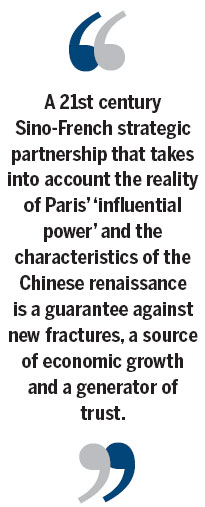Toward better understanding
Updated: 2013-04-19 09:32
By David Gosset (China Daily)
|
|||||||||||

France can play an important role in furthering China's relations with Europe
The ongoing high-level diplomatic activities between Paris and Beijing impact Sino-French partnership and Sino-European relations, but they also have a bigger global significance.
French Foreign Minister Laurent Fabius has just ended a two-day visit to China, paving the way for a visit by French President Francois Hollande, who will be the first top leader from a major Western nation to meet the new Chinese leader Xi Jinping.
As three simultaneous crises - economic, social and political - challenge the French government, Hollande will certainly be preoccupied by daunting domestic issues, but the nature of the relations he will be able to forge with China, the 21st century's most important factor of change, will also be of consequence for his presidency.
A decade ago, the French economy surpassed China's GDP, but today the Chinese economy represents more than three times French economic output, and by 2020, it will be six times bigger. Even if France's rank is diminishing in comparison with the rise of new actors, the country remains what Laurent Fabius rightly defines as an "influential power" apt to give political impulsions.
In its interactions with Beijing, Paris has often underlined the importance of stable relations between two permanent members of the UN Security Council - in contrast with the fluctuations of the era of Nicolas Sarkozy - but also, in reference to the 21-billion-euro ($27 billion) trade deficit in 2012, and called for more balanced economic relations between the two countries.
Clearly, there is considerable space for improvement, as Sino-French trade accounted for just 40 percent of the 144-billion-euro Sino-German trade that accounted for about one-third of China's total trade with Europe. Last year, China-French bilateral trade was down 2 percent year on year. China's exports to France fell 10 percent, while its imports from France rose 9 percent.
More generally, economic, financial, political and strategic relations between France and China are not commensurate with their mutual appreciation and reciprocal attraction, a formidable potential for synergy between the two edges of the Eurasian continent that is still waiting to be unleashed.
A renewed Sino-French relationship is beneficial for both sides as it helps to broaden the scope of Sino-European relations. In other words, Paris remains potentially the most effective political catalyst for a more autonomous EU foreign policy toward Beijing.
Hollande, who does not share his predecessor's fascination for the US, can develop a more independent policy toward China. Former French foreign minister Hubert Vedrine says he views France and the US as "friends, allies, but not aligned".
While European policymakers should design mechanisms in order to attract Chinese investment in Europe - China will invest more than $1 trillion globally in the coming decade, and grant China market economy status -which will be, in any case, accorded to Beijing under World Trade Organization rules from Dec 11, 2016, they should also lift an inopportune and counterproductive arms embargo.
In 1964, following the decision of Charles de Gaulle, France was the first among the major Western countries to establish diplomatic relations with Beijing at the ambassadorial level. Next year Paris and Beijing will celebrate the 50th anniversary of this historic moment.
On Jan 31, 1964, in the Elysee Palace, Charles De Gaulle concluded a news conference with a remark on what he called the "affinities" between France and China. These cultural and historical "affinities" have to be reactivated and serve as the fulcrum of a new joint global ambition.
Being the co-architect of a more cohesive European continent, apt to rally the energies across the continents, France's "influential power" prevents the risks of tensions between the West and the rest.
The rapid development of the BRICS is in itself a positive phenomenon but a new type of rivalry between the West and the emerging world could create great instability in the world.
In Africa, while China's growing presence does not have to be a loss for Euro-African relations, much effort is needed to better coordinate the Chinese and Western approaches toward what is arguably the continent of the future.
Mali, and beyond, the Sahelian space, cannot become the laboratory where China, Europe and Africa invent cooperation for peace and progress without a strong political understanding between Beijing and Paris.
A 21st century Sino-French strategic partnership that takes into account the reality of Paris' "influential power" and the characteristics of the Chinese renaissance is a guarantee against new fractures, a source of economic growth and a generator of trust.
The author is director of the Academia Sinica Europaea at China Europe International Business School, Shanghai, Beijing & Accra, and founder of the Euro-China Forum. The views do not necessarily reflect those of China Daily.
(China Daily 04/19/2013 page7)
Today's Top News
List of approved GM food clarified
ID checks for express deliveries in Guangdong
Govt to expand elderly care
University asks freshmen to sign suicide disclaimer
Tibet gears up for new climbing season
Media asked to promote Sino-Indian ties
Shots fired at Washington Navy Yard
Minimum growth rate set at 7%
Hot Topics
Lunar probe , China growth forecasts, Emission rules get tougher, China seen through 'colored lens', International board,
Editor's Picks

|

|

|

|

|

|





